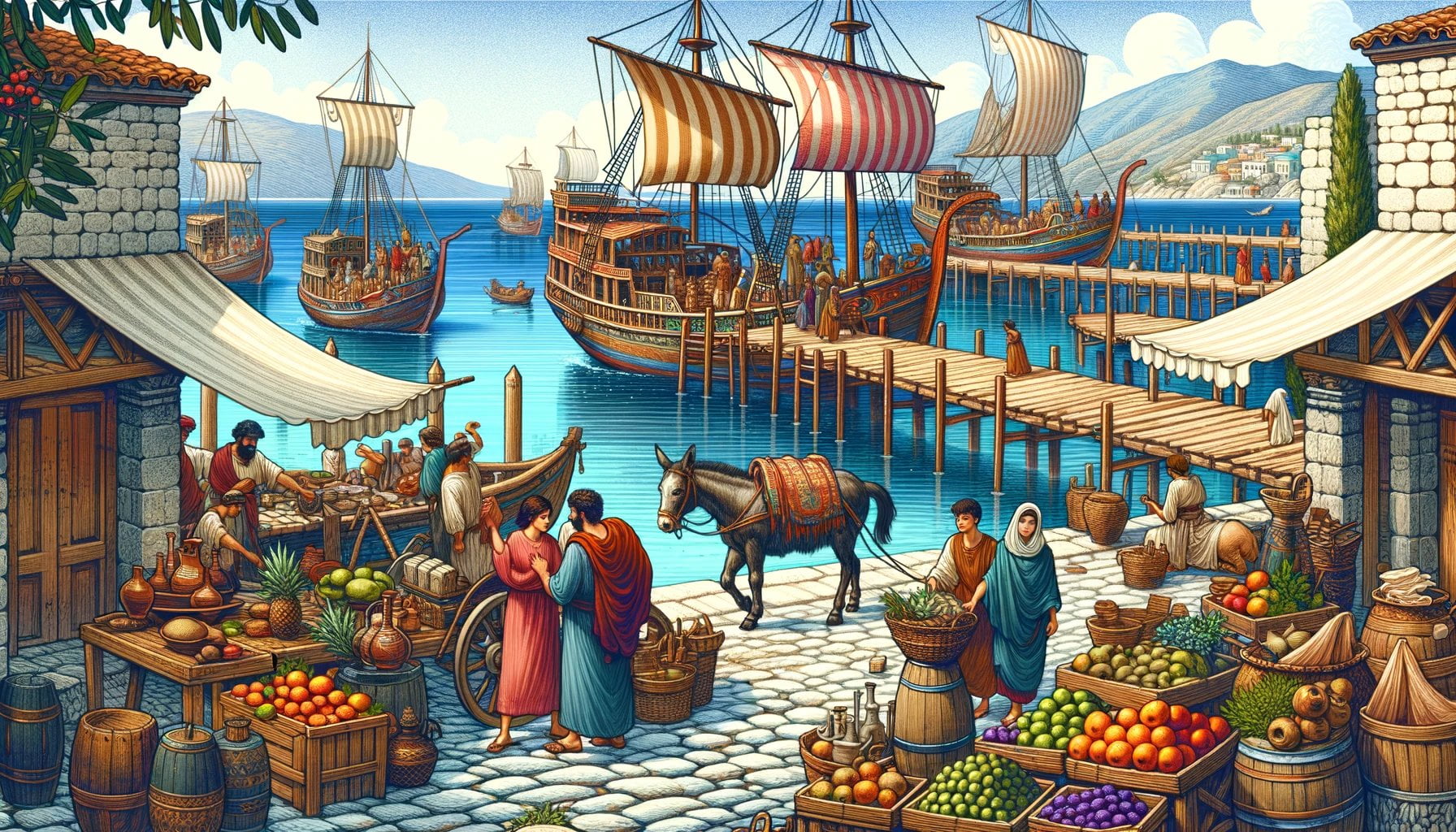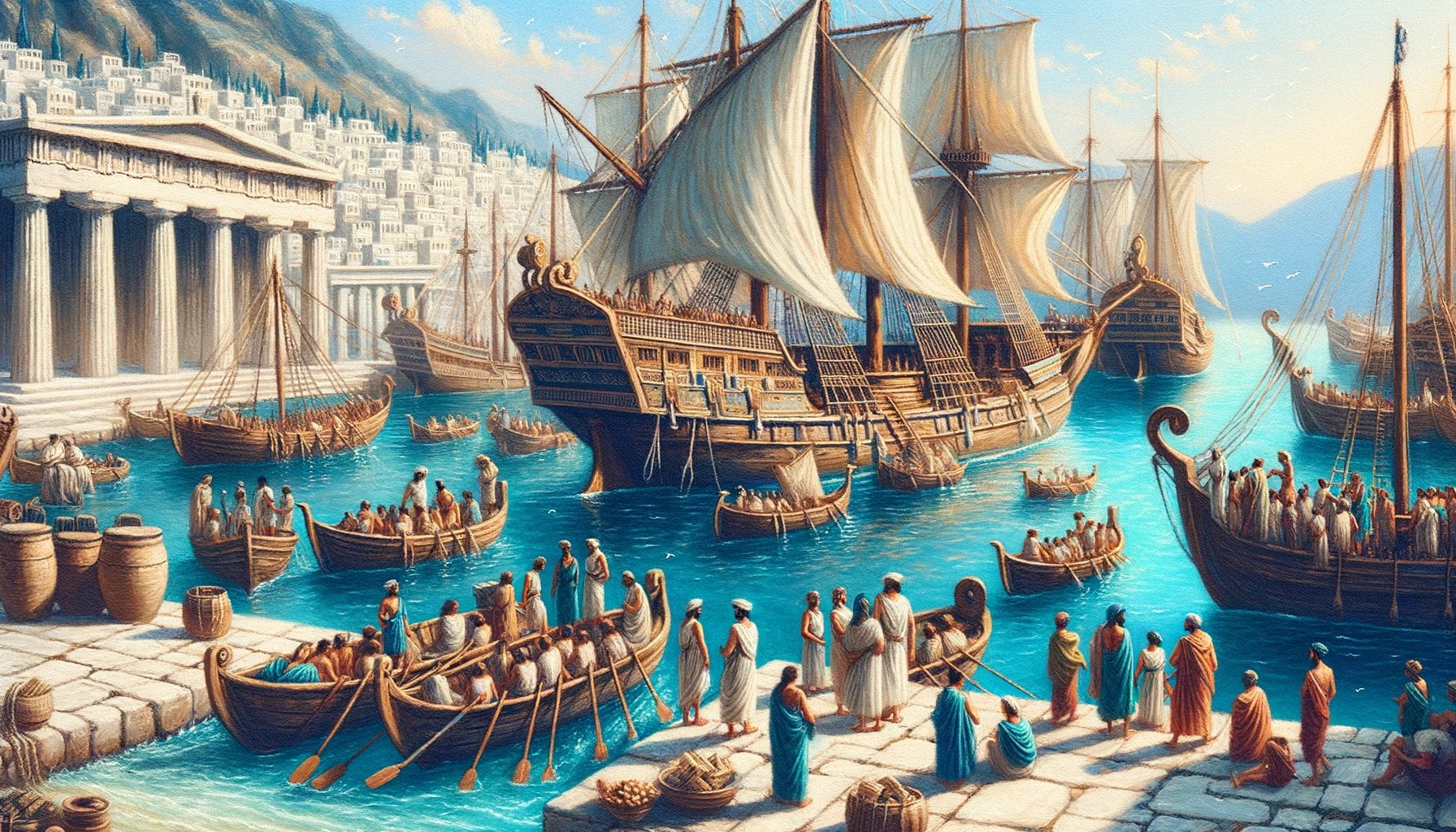Unlocking the Secrets of Greek Transportation in Ancient Times takes readers on an enthralling journey through the intricacies of the transportation systems that shaped the lives of the Greeks. Delving into the fascinating world of ancient civilizations, this article unveils the methods, infrastructure, and ever-evolving nature of transportation in ancient Greece. With a deep understanding of the subject matter, the article paints a vivid picture of how transportation networks played a pivotal role in both the daily lives and grand achievements of the Greeks. In this exploration, we uncover hidden gems, untangle historical context, and shed light on the cultural significance of Greek transportation in ancient times.

Key Takeaways:
- Ancient Greeks utilized various modes of transportation such as ships, carriages, and walking, depending on factors like topography, social status, and income.
- Traveling over land in ancient Greece was challenging due to the rough terrain and lack of roadways.
- Wagon, carriage, and cart transportation was common but considered costly.
- Walking was the most common form of transportation for both rich and poor ancient Greek citizens.
- Traveling by sea was the most efficient mode of transportation, especially for coastal cities like Athens.
- Geographical obstacles, including rough terrain and mountain ranges, made land travel difficult.
- Limited infrastructure due to political fragmentation hindered the development of extensive road networks similar to the Romans.
- Understanding ancient Greek transportation provides insights into their daily lives and the limitations they faced.
Greek Transportation in Ancient Times
Travel and transportation played a pivotal role in the daily lives of the ancient Greeks. From navigating challenging terrains to overcoming limited infrastructure, the Greeks developed various modes of transportation that shaped their society and influenced their achievements. In this article, we will explore the fascinating world of Greek transportation in ancient times.
Modes of Transportation
The ancient Greeks employed a variety of modes of transportation, each with its own advantages and challenges. Let’s delve into some of the most prominent ones:
- Travel over Terra Firma: The rugged and hilly landscapes of ancient Greece made land travel a difficult undertaking. With the lack of roadways, moving from one point to another posed significant challenges. Whether it was traversing mountainous regions or crossing uneven terrain, Greek travelers had to navigate through these obstacles with determination and resilience.
- Costly Transportation: Wagons, carriages, and carts were commonly used for carrying both people and goods in ancient Greece. However, these means of transportation came at a cost. The expense involved in maintaining and operating these vehicles made them accessible primarily to individuals with higher social status and wealth.
- Walking: The most common form of transportation for the average ancient Greek citizen, whether rich or poor, was walking. The Greeks were accustomed to traversing long distances on foot, whether for daily activities or extensive journeys. Walking not only provided a means of transportation but also presented an opportunity for individuals to connect with their surroundings, fostering a strong sense of community and shared experiences.
- Traveling via Sea: When it came to efficiency and speed, traveling by boat was the preferred mode of transportation in ancient Greece. The sea provided a vast network of routes that connected coastal cities such as Athens and allowed for easier and faster travel. Whether it was trade, exploration, or warfare, Greek ships played a crucial role in shaping the prosperity and influence of the ancient Greek civilization.
Challenges and Limitations
Greek transportation in ancient times was not without its challenges and limitations. Let’s explore some of the major obstacles that the Greeks encountered:
- Geographical Obstacles: The rough and hilly terrains of ancient Greece, coupled with the lack of developed roadways, presented significant challenges for land travel. The formidable mountain ranges posed engineering difficulties for the construction of roads, making it arduous to navigate through the land.
- Limited Infrastructure: Unlike the Romans who developed an extensive road network, the political fragmentation of ancient Greece hindered the construction of a similar infrastructure. The lack of proper roadways and transportation systems made travel more challenging, further emphasizing the reliance on other modes such as walking and sea travel.
Understanding the modes of transportation in ancient Greece provides us with invaluable insights into the daily lives and limitations of the people during that time period. It highlights their ability to adapt to the unique geographical features of their land and showcases the vital role transportation played in their society.
In conclusion, Greek transportation in ancient times encompassed a range of modes, from navigating challenging terrains to exploiting the vastness of the sea. The lack of developed infrastructure and the reliance on walking and sea travel shaped the lives of the ancient Greeks and influenced their achievements. By unlocking the secrets of Greek transportation, we gain a deeper understanding of their history, culture, and the remarkable resilience they displayed in the face of geographical obstacles.
In ancient Greece, queens held significant power and influence. Discover the captivating stories of ancient Greek queens by clicking on ancient greek queens.
The ancient Greeks believed in the prophetic abilities of certain women known as prophetesses. Uncover the fascinating world of ancient Greek prophetesses by clicking on ancient greek prophetess.
Ancient Greeks had unique and sometimes brutal ways of punishing wrongdoers. Delve into the world of ancient Greek punishment and explore its intriguing methods by clicking on ancient greek punishment.
The ancient Greeks were skilled craftsmen known for their exquisite daggers. Explore the artistry and significance of ancient Greek daggers by clicking on ancient greek daggers.
The Role of Roads and Land Transport
Roads in ancient Greece played a significant role in facilitating trade, communication, and transportation. Despite their limitations, such as being primarily dirt paths, these ancient roads served as the lifeline of the Greek civilization.
The significance of travel in ancient Greek culture
- Travel held high regard in Greek society due to their curiosity and innovative nature (World History Encyclopedia).
- Greek mythology and stories such as “Jason and the Golden Fleece” celebrated the benefits of traveling (World History Encyclopedia).
The state of roads in ancient Greece
- Ancient Greek roads formed a network connecting various regions and cities (HistoryDisclosure).
- Most roads were dirt paths, becoming dry and dusty in summers and muddy during winters (World History Encyclopedia).
- Some roads had ruts to facilitate cart transportation (History Link 101).
Trade and commerce transportation
- Due to the lack of proper roads, sea transportation was more efficient for shipping large quantities of goods, such as olive oil (Wikipedia).
- Greek ships of varying sizes were used to transport goods over the sea (ancientgreecefacts.com).
Challenges of road construction
- Road building in ancient Greece was limited due to geographical factors, including formidable mountain ranges (World History Encyclopedia).
- Political fragmentation among Greek city-states further hindered significant road construction (Encyclopedia.com).
Key Takeaways:
- Travel held great importance in ancient Greek culture, celebrated in mythology and stories.
- Ancient Greek roads were primarily dirt paths, prone to becoming dry and dusty in summers and muddy in winters.
- Sea transportation was more efficient for trade and commerce due to the limitations of road infrastructure.
- Geographical obstacles and political fragmentation posed challenges to road construction in ancient Greece.
Sources:
- Mark Cartwright. “Travel in the Ancient Greek World.” World History Encyclopedia. Here.
- “Travel by Land in Ancient Greece.” History Link 101. Here.
Innovations in Ancient Greek Transportation
Key Takeaways:
- Ancient Greece had a diverse range of transportation methods, including land travel, walking, and sea travel.
- Greek roads formed a network connecting different regions and cities, albeit mainly consisting of dirt paths.
- Walking was the most common form of transportation, fostering a sense of community and promoting social interaction.
- Greek ships played a crucial role in trade, exploration, and warfare, making sea travel fast and efficient.
- The Greeks made various innovations in water management, cleanliness, hygiene, and technology, influencing their transportation systems.
The ancient Greeks were a curious and innovative civilization, and this mindset extended to their approach to transportation. In the bustling society of ancient Greece, travel was highly valued and accessible to a significant portion of the population. While certain opportunities for travel were contingent upon one’s status and profession, many Greeks traversed the Mediterranean for various reasons: selling goods, showcasing their skills, embarking on religious pilgrimages, attending prestigious sporting events, or simply for leisure.
In order to facilitate these journeys, the ancient Greeks relied on a variety of transportation methods. Travel on land involved the use of carriages, horses, beasts of burden, or walking. Greece boasted an extensive road network that connected various cities and regions, allowing for convenient travel across the land. Religious pilgrimages to sanctuaries like Delphi and Delos were particularly popular among ancient Greek travelers, showcasing their deep spiritual beliefs and the centrality of religion in their daily lives.
For commercial purposes, traders, skilled craftsmen, and metalworkers undertook journeys to expand their markets and exchange goods. Wagons, carriages, and carts were utilized to transport these valuable items. However, it’s important to note that these modes of transportation were largely accessible only to the wealthy due to their costs and maintenance requirements. On the other hand, walking emerged as the most common form of transportation for both the rich and the poor, fostering a sense of community and cultural integration.
Sea travel also played a crucial role in ancient Greek transportation. Greek ships, known for their efficiency and speed, facilitated trade, exploration, and military conquests. Greece’s strategic geographical location, surrounded by the Mediterranean Sea, allowed their ships to dominate maritime trade routes and connect with other civilizations. The Greeks’ mastery of shipbuilding and navigation technologies enabled them to embark on ambitious voyages, expanding their cultural influence and knowledge beyond their borders.
In addition to their contributions to land and sea transportation, the ancient Greeks made significant innovations in various fields that indirectly impacted their transportation systems. They developed sophisticated methods of water management, ensuring the cleanliness and hygiene of their cities and public spaces. Additionally, they invented gears, screws, rotary mills, water clocks, water organs, and even catapults—technological advancements that contributed to overall societal progress and indirectly affected transportation.
It’s important to recognize that the ancient Greeks were not solitary inventors, but rather a civilization that borrowed ideas and built upon the innovations of others. They were influenced by neighboring civilizations and actively sought out new knowledge and techniques to advance their society. Thus, their transportation systems and innovations were a reflection of their relentless pursuit of progress.
To truly understand ancient Greek transportation is to unlock their daily lives and limitations, revealing their adaptability and the intrinsic importance of transportation in their society. By examining their modes of travel, the connectivity of their road networks, and the effectiveness of their ships, we gain insights into the diverse facets of ancient Greek civilization and appreciate the ambitious and innovative spirit that defined them.
SOURCES:
Transportation in Ancient Greek Society
Transportation in ancient Greece was a key aspect of daily life and played a significant role in shaping Greek society. From walking and chariots to ships, the Greeks employed various modes of transportation that reflected their social class, wealth, and the challenging terrain they inhabited. Let’s delve into the fascinating world of transportation in ancient Greek society and discover the secrets it holds.
Modes of Transportation in Ancient Greece
The ancient Greeks utilized multiple modes of transportation to navigate their vast and diverse landscape. Whether it was traversing the rugged mountainous terrain or sailing the Aegean Sea, the Greeks adapted their transportation methods to suit their needs.
1. Walking – The Common Way of Getting Around
Walking was the most common and accessible mode of transportation for both rich and poor Greeks. It fostered a sense of community as people interacted while traveling on foot. The lack of developed road networks meant that walking was not only practical but often necessary.
2. Ships – The Efficient Form of Transportation
In ancient Greece, the sea played a significant role in transportation, especially for coastal cities like Athens. Greek ships were efficient and fast, enabling trade, exploration, and warfare. The Greeks were skilled sailors, and their ships facilitated contact with different peoples and the exchange of goods across regions.
3. Chariots – Primarily Used for Warfare and Competition
Chariots were primarily used for warfare and racing competitions in ancient Greece. They were not a common mode of transportation for daily travel but rather showcased the Greeks’ skill and prowess on the battlefield and in sporting events.
4. Other Forms of Transportation
While walking and ships were the primary modes of transportation, the Greeks also employed wagons, carriages, and carts. However, these means of transportation were costly and mainly accessible to the wealthy.
The Challenges and Significance of Greek Transportation
Transportation in ancient Greece presented numerous challenges and had profound cultural and societal significance. The rugged mountainous terrain and lack of developed road networks made land travel arduous and time-consuming. As a result, the Greeks heavily relied on walking and sea travel to overcome these obstacles.
1. Trade and Travel – Catalysts for Greek Society
Trade and travel played vital roles in ancient Greek society. The Greeks were avid travelers, exploring different regions and establishing connections with diverse peoples. Trade facilitated the exchange of goods, ideas, and cultural practices, contributing to the flourishing of Greek civilization.
2. The Impact of Transportation on Greek Life
Transportation was an essential part of everyday life in ancient Greece. It enabled trade, travel, and cultural activities, allowing the Greeks to expand their knowledge and experiences. Understanding the intricacies of Greek transportation provides valuable insights into their daily lives, limitations, and adaptability.
Key Takeaways:
- Ancient Greeks employed various modes of transportation, including walking, ships, and chariots.
- Walking was the most common way of getting around, promoting social interaction.
- Ships played a crucial role in trade, exploration, and warfare, given the sea’s significance in Greek society.
- Chariots were primarily used for warfare and racing competitions, highlighting the Greeks’ skill and competitive spirit.
- Travel and trade played essential roles in connecting different regions, fostering cultural exchange and societal growth.
Sources:
– Studybuff – What did ancient Greeks use as transportation?
– World History Encyclopedia – Travel in the Ancient Greek World

FAQ
Q1: What were the main modes of transportation in ancient Greece?
A1: The main modes of transportation in ancient Greece were travel over land, costly transportation using wagons and carriages, walking, and traveling via sea.
Q2: What were the challenges faced in transportation in ancient Greece?
A2: The transportation in ancient Greece faced challenges such as geographical obstacles, including rough hilly terrain and lack of roadways, and limited infrastructure due to political fragmentation.
Q3: Why was walking the most common form of transportation in ancient Greece?
A3: Walking was the most common form of transportation in ancient Greece because it was accessible and affordable for both rich and poor citizens.
Q4: What was the most efficient mode of transportation in ancient Greece?
A4: The most efficient mode of transportation in ancient Greece was by boat, as the sea offered easier and faster travel, especially for coastal cities.
Q5: How did the state of roads affect transportation in ancient Greece?
A5: The state of roads in ancient Greece, which were primarily dirt paths, made land travel challenging. Lack of roadways and limited infrastructure hindered the development of an extensive road network.












